Jake Buehler
Jake Buehler is a freelance science writer, covering natural history, wildlife conservation and Earth's splendid biodiversity, from salamanders to sequoias. He has a master's degree in zoology from the University of Hawaii at Manoa.

Trustworthy journalism comes at a price.
Scientists and journalists share a core belief in questioning, observing and verifying to reach the truth. Science News reports on crucial research and discovery across science disciplines. We need your financial support to make it happen – every contribution makes a difference.
All Stories by Jake Buehler
-
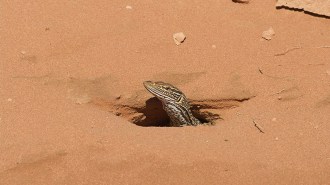 Life
LifeMonitor lizards’ huge burrow systems can shelter hundreds of small animals
Two species of Australian monitor lizards dig nests four meters deep. Now scientists reveal that the burrows are home to far more than their creators.
-
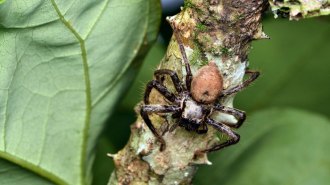 Animals
AnimalsThese spiders may sew leaves into fake shelters to lure frogs to their doom
Madagascar’s huntsman spiders use silk to turn two leaves into a cool hollow. Such microhabitats may appeal to the spiders’ prey, a study suggests.
-
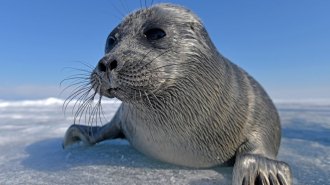 Animals
AnimalsUsing comb-shaped teeth, Baikal seals feed on tiny crustaceans like whales do
Seals in Lake Baikal use comb-shaped teeth to catch scores of amphipods, a study finds. The diet may be behind the seals’ relative success.
-
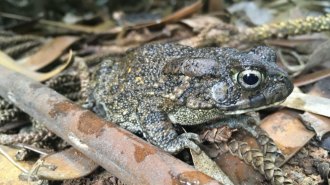 Animals
AnimalsGuttural toads shrank by a third after just 100 years on two islands
Introduced in the 1920s, toads on two islands in the Indian Ocean have shrunken limbs and bodies that may be evidence that "island dwarfism" can evolve quickly.
-
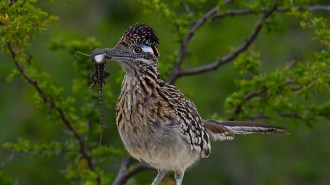 Animals
AnimalsHundreds of new genomes help fill the bird ‘tree of life’
More than 10,000 bird species live on Earth. Now, researchers are one step closer to understanding the evolution of all of this feathered diversity.
-
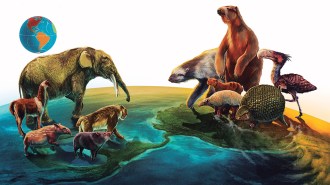 Paleontology
PaleontologyWhy South America’s ancient mammals may have lost out to northern counterparts
When North and South America joined millions of years ago, mammals from the north fared better in the meetup. Extinctions in the south may be why.
-
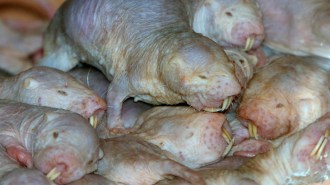 Animals
AnimalsNaked mole-rats invade neighboring colonies and steal babies
Naked mole-rats invade neighboring colonies, steal pups and evict any others left behind. The show of force may be central to their underground lifestyle.
-
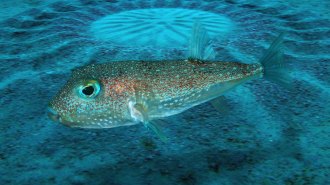 Animals
AnimalsPufferfish may be carving mysterious ‘crop circles’ near Australia
In 2011, scientists discovered that tiny pufferfish were sculpting Japan’s underwater “mystery circles.” Now, more circles have emerged in Australia.
-
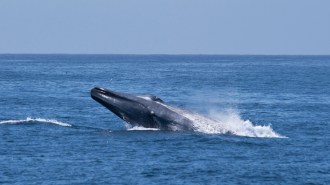 Life
LifeBefore migrating, some blue whales switch up the timing of their songs
Pacific blue whales change the daily timing of their songs ahead of migration, helping scientists better anticipate these massive animals’ movements.
-
 Animals
AnimalsCulling dingoes with poison may be making them bigger
Meat laced with toxic powder has been used for decades to kill dingoes. Now, dingoes in baited areas are changing: They’re getting bigger.
-
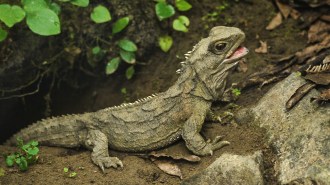 Animals
AnimalsHow tuatara live so long and can withstand cool weather
Tuatara may look like your average lizard, but they’re not. Now, researchers have deciphered the rare reptiles’ genome, or genetic instruction book.
-
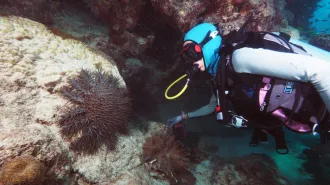 Life
LifeFish poop exposes what eats the destructive crown-of-thorns starfish
During population booms, crown-of-thorns can devastate coral reefs. Identifying predators of the coral polyp slurpers could help protect the reefs.